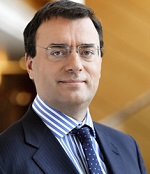Sanofi's ($SNY) dengue fever vaccine launch turned to Asia this week in separate developments in the Philippines and India.
The Philippines' FDA approved the first-of-its-kind vaccine, Dengvaxia, on Tuesday, becoming the first Asian country to do so and the second worldwide after Mexico's regulatory nod earlier this month. And on the same day, India's Economic Times reported that the government there is exploring opportunities to accelerate marketing authorization for the vaccine, considering exempting it from large local clinical trials.
In India, the talks could set the stage for the vaccine's availability through the nation's distribution system and private channels, following on Sanofi's stated mission to favor wide availability in the launch of its decades-in-development vaccine. This summer, Sanofi said it expected to file in 20 nations by the end of the year, and a spokesperson confirmed last week that it has submitted for licensure in "many endemic countries simultaneously."
 |
| Sanofi Pasteur CEO Olivier Charmeil |
Sanofi Pasteur CEO Olivier Charmeil said in a statement that the Philippines approval is a "major milestone in dengue prevention and public health," as Asia bears 70% of the world's dengue burden with 67 million annual cases. The ET reported that last year India saw more than 90,000 dengue fever cases, though that number could be off due to low detection rates.
In the dengue field, Sanofi is trailed by Japan's Takeda and additionally could see its India market impacted by a move earlier this year from the Serum Institute of India. In September, that company filed for fast-track approval of a dengue treatment amid the nation's capital's worst outbreak in 5 years.
Analysts have predicted that Takeda could be battling for market share with its DENVax by 2020.
With a potential market of 3 billion to 4 billion people, Dengvaxia is expected to bring Sanofi more than $1 billion in peak sales. The French pharma has spent 20 years and more than $1.5 billion to develop the shot, and has stated that its intention is to market the jab in endemic nations first rather than in the U.S. and Europe.
- here's the release
- get more from the Economic Times